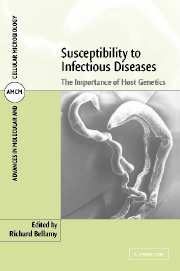Book contents
- Frontmatter
- Contents
- Contributors
- 1 Introduction
- 2 Application of genetic epidemiology to dissecting host susceptibility/resistance to infection illustrated with the study of common mycobacterial infections
- 3 The diverse genetic basis of immunodeficiencies
- 4 Genetic diversity in the major histocompatibility complex and the immune response to infectious diseases
- 5 The cystic fibrosis transmembrane conductance regulator
- 6 The influence of inherited traits on malaria infection
- 7 Polymorphic chemokine receptor and ligand genes in HIV infection
- 8 NRAMP 1 and resistance to intracellular pathogens
- 9 The interleukin-12/interferon-γ loop is required for protective immunity to experimental and natural infections by Mycobacterium
- 10 Mannose-binding lectin deficiency and susceptibility to infectious disease
- 11 Blood group phenotypes and infectious diseases
- 12 Genetics of human susceptibility to infection and hepatic disease caused by schistosomes
- 13 Genetic susceptibility to prion diseases
- Index
- Plate section
6 - The influence of inherited traits on malaria infection
Published online by Cambridge University Press: 14 August 2009
- Frontmatter
- Contents
- Contributors
- 1 Introduction
- 2 Application of genetic epidemiology to dissecting host susceptibility/resistance to infection illustrated with the study of common mycobacterial infections
- 3 The diverse genetic basis of immunodeficiencies
- 4 Genetic diversity in the major histocompatibility complex and the immune response to infectious diseases
- 5 The cystic fibrosis transmembrane conductance regulator
- 6 The influence of inherited traits on malaria infection
- 7 Polymorphic chemokine receptor and ligand genes in HIV infection
- 8 NRAMP 1 and resistance to intracellular pathogens
- 9 The interleukin-12/interferon-γ loop is required for protective immunity to experimental and natural infections by Mycobacterium
- 10 Mannose-binding lectin deficiency and susceptibility to infectious disease
- 11 Blood group phenotypes and infectious diseases
- 12 Genetics of human susceptibility to infection and hepatic disease caused by schistosomes
- 13 Genetic susceptibility to prion diseases
- Index
- Plate section
Summary
INTRODUCTION
The history of genetics and the study of malaria are inextricably linked. The burden of disease due to malaria across much of the world has selected for a series of very visible traits of major medical importance, including the alleles of genes encoding haemoglobin, red cell enzymes, and membrane proteins. Furthermore, it now appears that many other genes may also influence the outcome of infection, including some that modulate the immune responses and others that encode for endothelial proteins as might be expected from the intricate life cycle of the parasite in the human host (Fig. 6.1).
A short chapter cannot hope to be a comprehensive description of such a large field of scientific endeavour. The selection of evidence and the discussion of its significance are inevitably personal. Nevertheless, we will attempt to address some of the major questions that have been at the heart of studies of the genetic influence on malaria infection, including ‘What is the overall impact of genetics on malaria infection?’, ‘What protective traits have been identified already?’, ‘How can we identify new protective traits?’, and ‘How do these traits result in protection?’ The approaches we can use to study these questions continue to change with new genetic and molecular techniques that allow us to extract and analyse more genetic information, not least of which is the sequence of both the human and parasite genomes. However, we must not be satisfied with a simple catalogue of resistance traits to malaria.
- Type
- Chapter
- Information
- Susceptibility to Infectious DiseasesThe Importance of Host Genetics, pp. 139 - 184Publisher: Cambridge University PressPrint publication year: 2003
- 3
- Cited by

